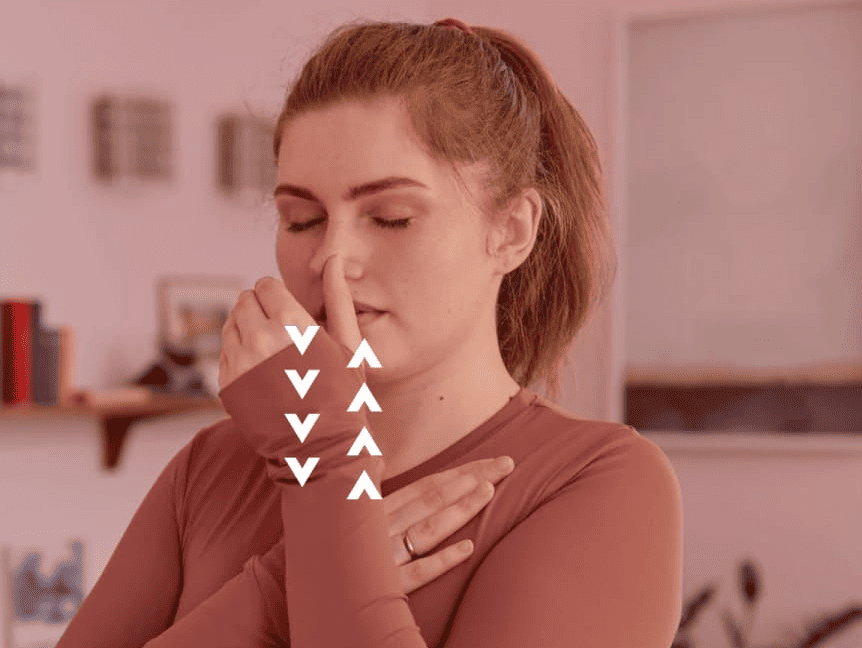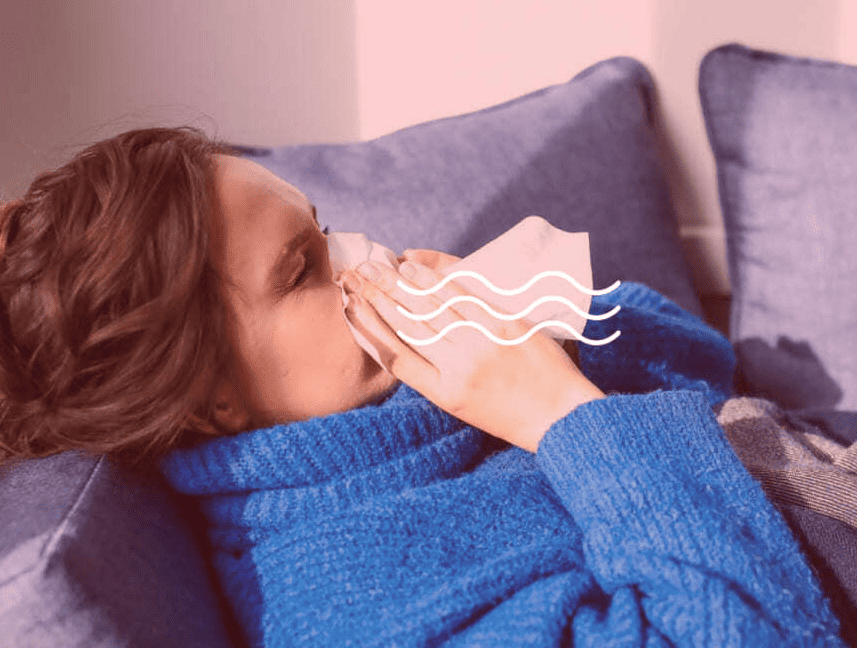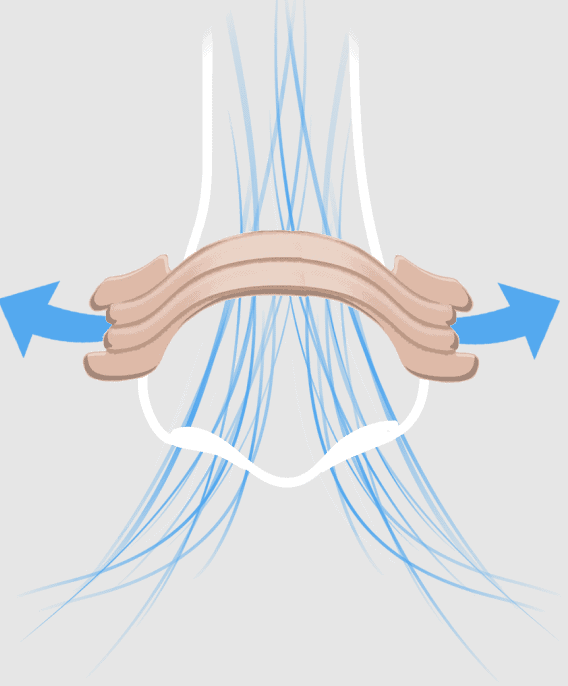Ever wake up with that scratchy, uncomfortable feeling in your nose? Dry nose isn’t just annoying (those crusty nostrils!), it can disrupt sleep, lead to nosebleeds, and even make you more susceptible to infection.

Scientific review provide valuable insights into dry nose and offers effective treatments, emphasizing the effect of this condition.
This guide tackles the often-overlooked issue of dry nose. We’ll explore why the nasal passage dries and delve into solutions to manage and prevent it effectively.
So, let’s roll up our sleeves and say goodbye to dry nose for good!
Why Is My Nose So Dry?
Several culprits can leave your nose feeling like a desert. Let’s explore some common causes:
- Low humidity environments: Dry winter air, arid climates, and even air conditioning can steal moisture from your nasal passages.
- Air conditioning or heating: Both systems can significantly reduce indoor humidity, leading to dryness.
- Dehydration: Not drinking enough fluids dries out your entire body, including your nasal membranes.
- Nasal decongestant overuse: While decongestants provide relief, prolonged use can cause a rebound effect, leading to even worse dryness.
- Antihistamine side effects: Many antihistamines dry out mucus production, potentially causing a dry nose.
- Smoking: Irritates nasal passages and reduces mucus production, contributing to dryness.
- Aging: As we age, our bodies naturally produce less moisture, making dryness more common.
- Medical Conditions: Underlying conditions like Sjogren’s syndrome can affect mucus production and contribute to a dry nose.
Gentle Relief Solutions for Dry Nose Symptoms
Conquering dry nose discomfort depends on understanding the root cause. This guide explores various gentle remedies tailored to address your specific needs. Remember, a dry nose often signifies irritation, so prioritizing gentle care is crucial to promote healing and restore comfort to your nasal passages.

1. Nasal Strips: Enhancing Airflow
Nasal strips are adhesive bands applied across the bridge of your nose. They work by gently lifting the sides of the nostrils, which offers a two-fold benefit:
- Improved Airflow: By opening up the nasal passages, strips can ease congestion and stuffiness, promoting better breathing, especially during sleep.
- Potential Moisture Retention: The slight seal created by the strips may help reduce moisture loss from the nasal passages. This can be especially helpful in dry environments or when dealing with dry nose symptoms.
Different brands and sizes of nasal strips are available. Look for strips that are comfortable to wear and provide the level of support you need. You can read our guide to the best nasal strips to find the best fit for you.

2. Humidifiers: Bringing Balance to Your Air
Humidifiers are game-changers when it comes to creating a balanced indoor environment. By maintaining the optimal humidity level to sleep, usually between 40-60%, you can alleviate nasal dryness and enhance breathing comfort.
Especially during sleep, when our bodies naturally lose moisture, having the right humidity level is crucial for optimal rest and nasal health. Investing in a humidifier can help ensure that your indoor air remains comfortable, promoting better sleep quality and reducing the chances of waking up with a dry nose. So, aim for that sweet spot in humidity to enjoy restful nights and refreshed mornings.
3. Saline Solutions: Simple and Effective Hydration
Saline nasal sprays and drops are a safe and gentle way to soothe and moisturize dry, irritated nasal passages. The saline solution, essentially salt water, helps to loosen and clear mucus buildup. This promotes drainage and reduces congestion, making breathing easier.
Saline solution helps restore hydration to the nasal lining, alleviating dryness and discomfort. Safe for regular use and unlikely to cause irritation, saline sprays are a drug-free approach to keeping your nasal passages moist and comfortable.
4. Nasal Gel and Ointments: Targeted Moisture
For intense dryness and irritation, nasal gels and ointments provide a thicker, more concentrated layer of moisture relief. These petroleum-based or water-soluble products offer several benefits.
They form a protective barrier on the inner lining of the nose, preventing further moisture loss and irritation from allergens or pollutants. Ingredients in nasal gels like menthol or aloe vera can provide a cooling and calming sensation, reducing discomfort caused by dryness and inflammation. Compared to sprays or drops, gels and ointments offer longer-lasting moisture, making them ideal for nighttime use or arid environments.
Important Note: Due to their thickness, gels and ointments may not be suitable for everyone. Consult a doctor if you have any underlying nasal conditions or experience congestion, as these products can temporarily block airflow.
5. Adequate Hydration: The Foundation of Nostril Health
Adequate hydration is fundamental for overall health, including maintaining healthy nostrils. Drinking enough water is key to preventing and treating a dry nose. When your body is properly hydrated, it can produce an adequate amount of moisture to keep your nasal passages lubricated and comfortable.
Additionally, staying hydrated helps thin out mucus, making it easier to expel irritants and prevent congestion. By making hydration a priority, you can support optimal nasal health and reduce the risk of experiencing discomfort associated with dryness. So, remember to drink plenty of water throughout the day to keep your nose happy and healthy.
6. Steam Therapy: Natural Congestion Relief
Steam therapy is like nature’s own humidifier for your nose. It’s incredibly soothing, especially when your nasal passages are feeling dry and congested. By breathing in the warm steam, you’re giving your nose a much-needed moisture boost.
The steam helps to clear out any congestion, making it easier to breathe. You can try it out by either using a steam inhaler or simply enjoying a hot shower. It’s a simple, natural way to bring comfort to your nose and help you breathe better.
7. Lifestyle Adjustments: Minimizing Triggers
Simple lifestyle changes can significantly reduce dry nose episodes:
- Breathe through your nose: Mouth breathing dries out the nasal passages. Breathing through your nose vs mouth breathing offers various benefits, so make a conscious effort to breathe through your nose.
- Use a humidifier: Adding moisture to the air, especially at night, can help prevent dryness and congestion.
- Limit decongestant use: While decongestants provide temporary relief, overuse can worsen dryness in the long run.
- Drink plenty of fluids: Staying hydrated keeps your entire body moist, including your nasal membranes.
- Avoid irritants: Smoke, dust, and other airborne pollutants can irritate the nasal passages and worsen dryness.
8. Professional Treatments: Beyond Home Remedies
If nasal dryness persists despite home remedies, or if it becomes severe, it may be time to consider professional medical treatments. Consulting a healthcare provider is advisable when nasal dryness interferes with daily life or is accompanied by other concerning symptoms such as nosebleeds or persistent congestion.
Professional treatments may include prescription nasal sprays, allergy medications, or procedures to address underlying conditions like nasal polyps or deviated septum. These interventions can provide targeted relief and address the root cause of nasal dryness, ensuring long-term nasal health and comfort. Don’t hesitate to seek medical advice for persistent or severe nasal dryness.
9. Preventative Measures
To prevent nasal dryness, consider environmental control and personal care routines. Drinking plenty of fluids throughout the day keeps your entire body well-hydrated, including your nasal membranes. If you suspect a medical condition is contributing to dry nose, consult a doctor for proper diagnosis and treatment.
Maintain optimal humidity levels in your home, around 40-60%, using a humidifier. Keep your nasal passages moist by using saline nasal sprays or applying a thin layer of petroleum jelly inside your nostrils. Avoid irritants like cigarette smoke and allergens.
If you use CPAP, ensure proper CPAP device maintenance and use a heated humidifier attachment if available. If you still snore while using a CPAP device, consult your healthcare provider to adjust settings or explore alternative treatments. By implementing these strategies, you can proactively prevent nasal dryness and enjoy better nasal health.
When to Consult a Healthcare Provider
Knowing when to seek help from a healthcare provider for dry nose issues is crucial. If you’re experiencing persistent dryness that doesn’t improve with home remedies, it’s time to schedule a visit. Look out for signs like frequent nosebleeds, ongoing congestion, or difficulty breathing through your nose.

If dry nose starts interfering with your daily life or sleep, it’s definitely worth discussing with a professional. Pay attention to any other unusual symptoms like nasal pain, discharge, or changes in smell. Your healthcare provider can offer personalized advice and treatment options to help you find relief and improve your nasal health.
Approach to Comfortable Nighttime Breathing
For comfortable nighttime breathing, take a comprehensive approach to managing dry nose. If using mouth tapes for sleep, ensure they don’t exacerbate dryness. Maintain optimal humidity levels with a humidifier, or use saline sprays to keep the nasal passages moist and comfortable throughout the night.
Remember to consult a healthcare provider if symptoms persist or worsen. Addressing underlying causes like allergies or sinus issues is essential. Don’t overlook the importance of hydration and personal care routines. By taking proactive steps and seeking professional guidance when needed, you can achieve lasting relief and well-being for your nasal health. Prioritize your comfort and breathe easy all night long.



